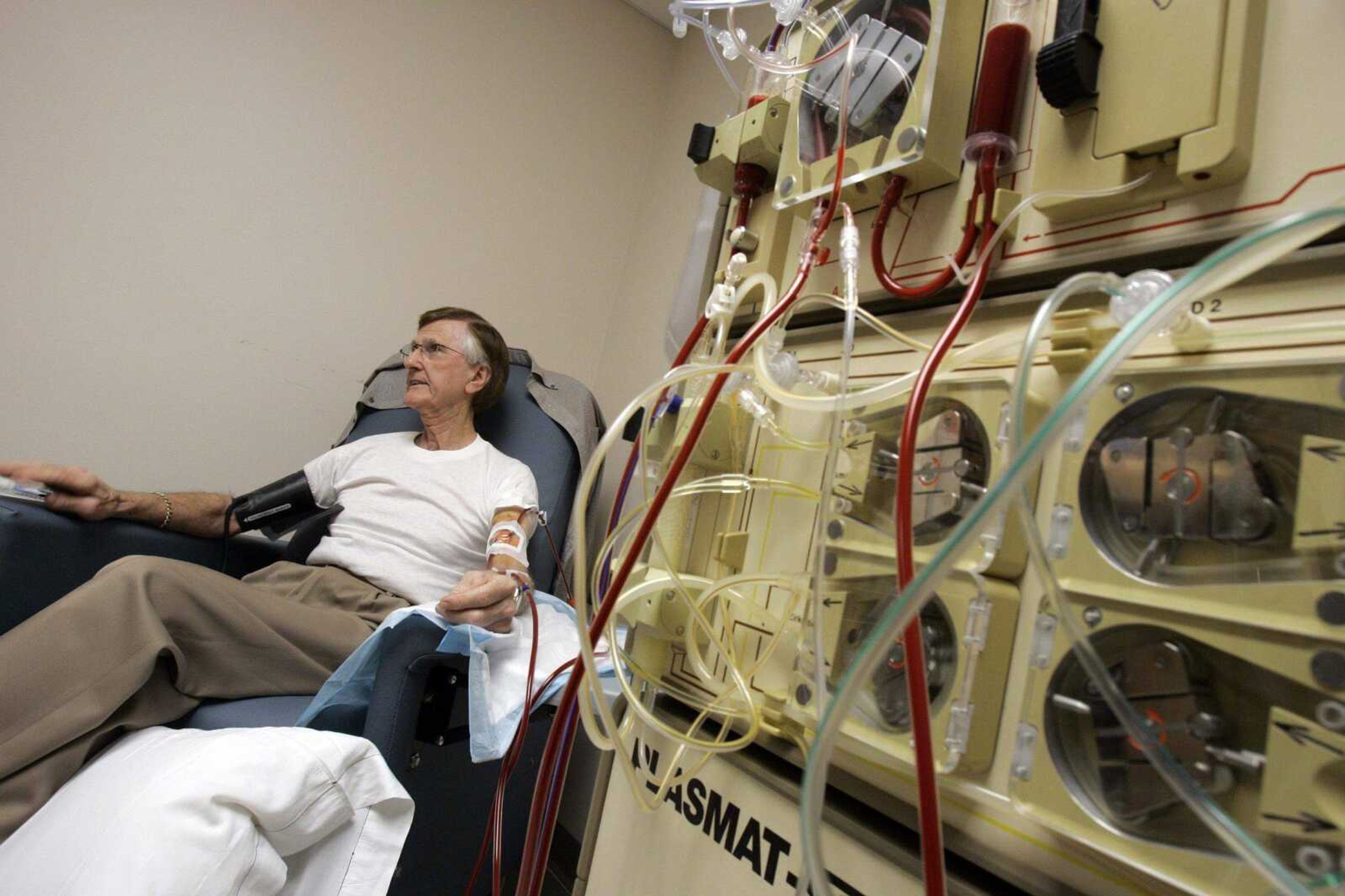Treatment filters out bad cholesterol
ST. LOUIS — Ted Harrison tries not to eat food with more than 2 grams of fat per serving; he's tried just about every cholesterol-fighting medication on the market, and just the same he's had more than a dozen surgeries to clear up heart and artery problems...
ST. LOUIS — Ted Harrison tries not to eat food with more than 2 grams of fat per serving; he's tried just about every cholesterol-fighting medication on the market, and just the same he's had more than a dozen surgeries to clear up heart and artery problems.
The retired Hanes clothing designer, 71, has been trying a treatment in recent weeks that's newly available in St. Louis, having his blood removed from his body, his bad LDL cholesterol filtered out, and the newly cleaned plasma returned with his red blood cells back to his system.
Harrison joked that he thought the new treatment might be a way to sneak an occasional hamburger, but said instead it may help keep heart attack or stroke at bay.
"It's necessary," he said of the treatment he receives during a roughly two-hour visit to Barnes-Jewish Hospital in St. Louis every two weeks. "I fight this every day of my life."
He and others at Barnes-Jewish started receiving treatment this summer through the HELP system, which stands for Heparin-induced Extracorporeal Lipoprotein Precipitation.
During a recent treatment, he sat in a chair next to a machine, which removed the blood from his body through narrow tubes that ran along his arm.
The red blood cells and plasma were separated, and the plasma was run through a device containing material that filtered out LDL cholesterol. Once the LDL is removed, the plasma and red blood cells were put back in his body.
Harrison said at times his cholesterol has been as high as 400, but normally tests at around 300. Overall, people's cholesterol should be below 200 to be considered at a healthy level.
Dr. Anne Carol Goldberg, an endocrinologist and cholesterol specialist, told him his cholesterol was down to about 180 thanks to use of the system. High levels of cholesterol can cause deposits called plaques to form inside blood vessels, narrowing arteries and blocking blood flow.
Patients who use the system see their LDL cholesterol fall, but must repeat the treatment for the results to last. They may experience reduced heart and leg pain due to less blockage as a result.
To be a candidate for the therapy, a person must have an LDL cholesterol level of more than 300 after at least six months of drug treatment and lifestyle changes, including a diet low in saturated fat. People who already have cardiovascular disease can take part if their LDL cholesterol levels remain above 200 after already trying the maximum tolerated therapy.
More than 20 centers in the United States offer the cholesterol-filtering technique, which is called LDL apheresis, but the Center for Advanced Medicine at Washington University and Barnes-Jewish is the only one in the St. Louis area.
Harrison, who looks healthy and fit, said many of his relatives on his mother's side have struggled with high cholesterol, an inherited issue in their family. He has needed multiple surgeries over the years to have heart and artery stents placed in his body to try to prevent blockages.
While the cholesterol-filtering treatment must be repeated every two weeks in Harrison's case, he hopes it can help with his health in a way that drugs had not been able to help him. "I've taken everything the doctors and pharmaceutical companies can come up with," he said.
LOCAL LOOK
To find out what members of the Cape Girardeau health community have to say about cholesterol treatments, check out this story on semissourian.com
Connect with the Southeast Missourian Newsroom:
For corrections to this story or other insights for the editor, click here. To submit a letter to the editor, click here. To learn about the Southeast Missourian’s AI Policy, click here.










